PHOTOS: New Rijeka Urban Parks Just One Lasting Legacy of ECoC 2020
January 27, 2021 – Rising sharply up into the foothills, little space in the expansion of Rijeka was left for green and community recreation areas. New Rijeka urban parks address the issue and are just one lasting legacy of ECoC 2020
The preparations for Rijeka European Capital of Culture 2020 were years in the making. Community consultations and contributions for every aspect of the arts, each venue and city institution put their enthusiasm behind the project. And that's without even mentioning all the international contributors whose work was commissioned. It really did feel like the whole city had come together to show the best of themselves in Rijeka's special year. Except, 2020 turned out to be special for all the wrong reasons.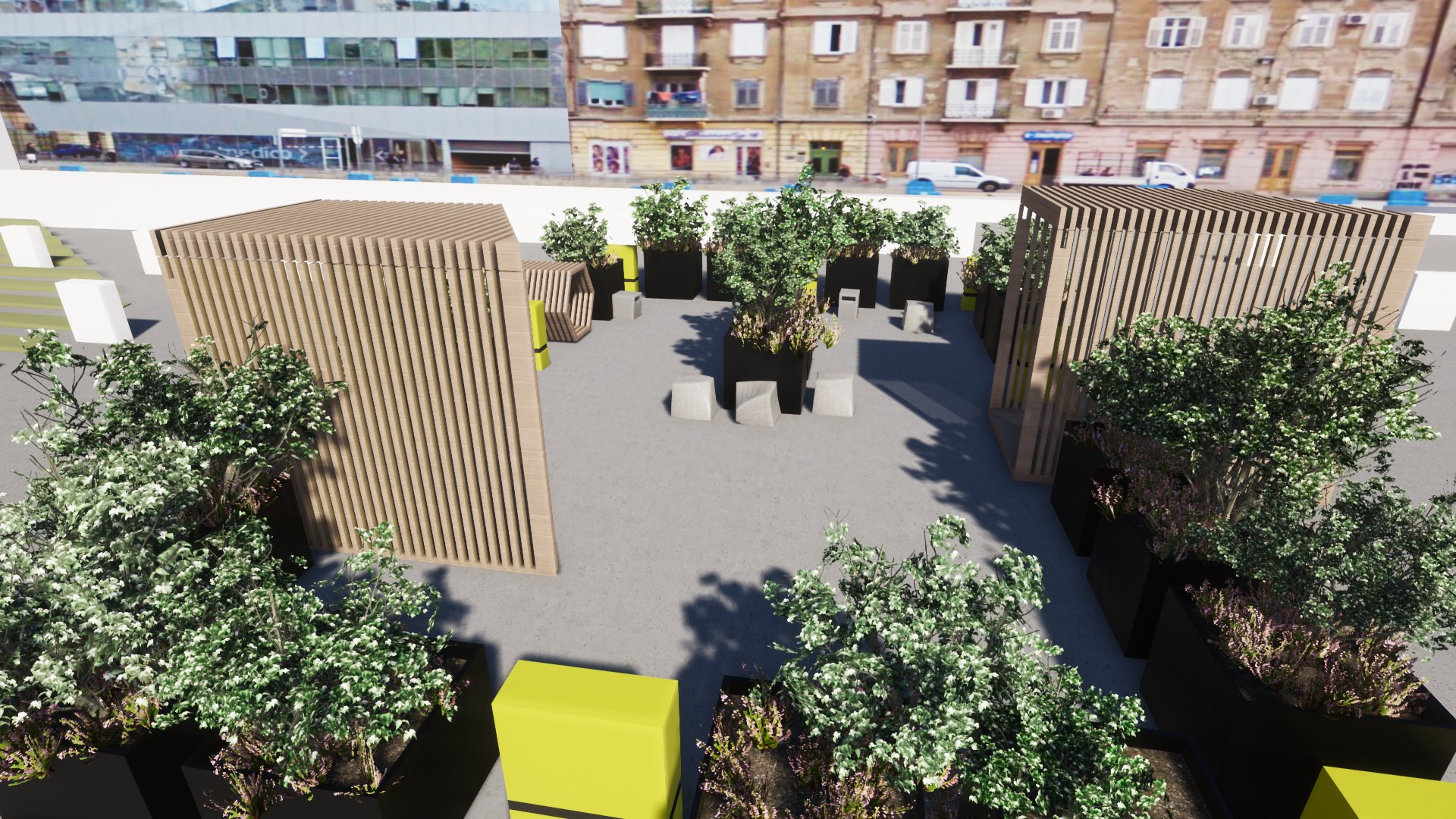
European authorities granted the European Capital of Culture status to Rijeka for extra months in order to allow them to complete some programs halted by the pandemic. Not that it much helped increase the footfall the vast project was meant to attract to the Kvarner capital's streets. Instead, the streets lay bereft of guests, visited only by Rijeka residents. But, that's not such a bad thing.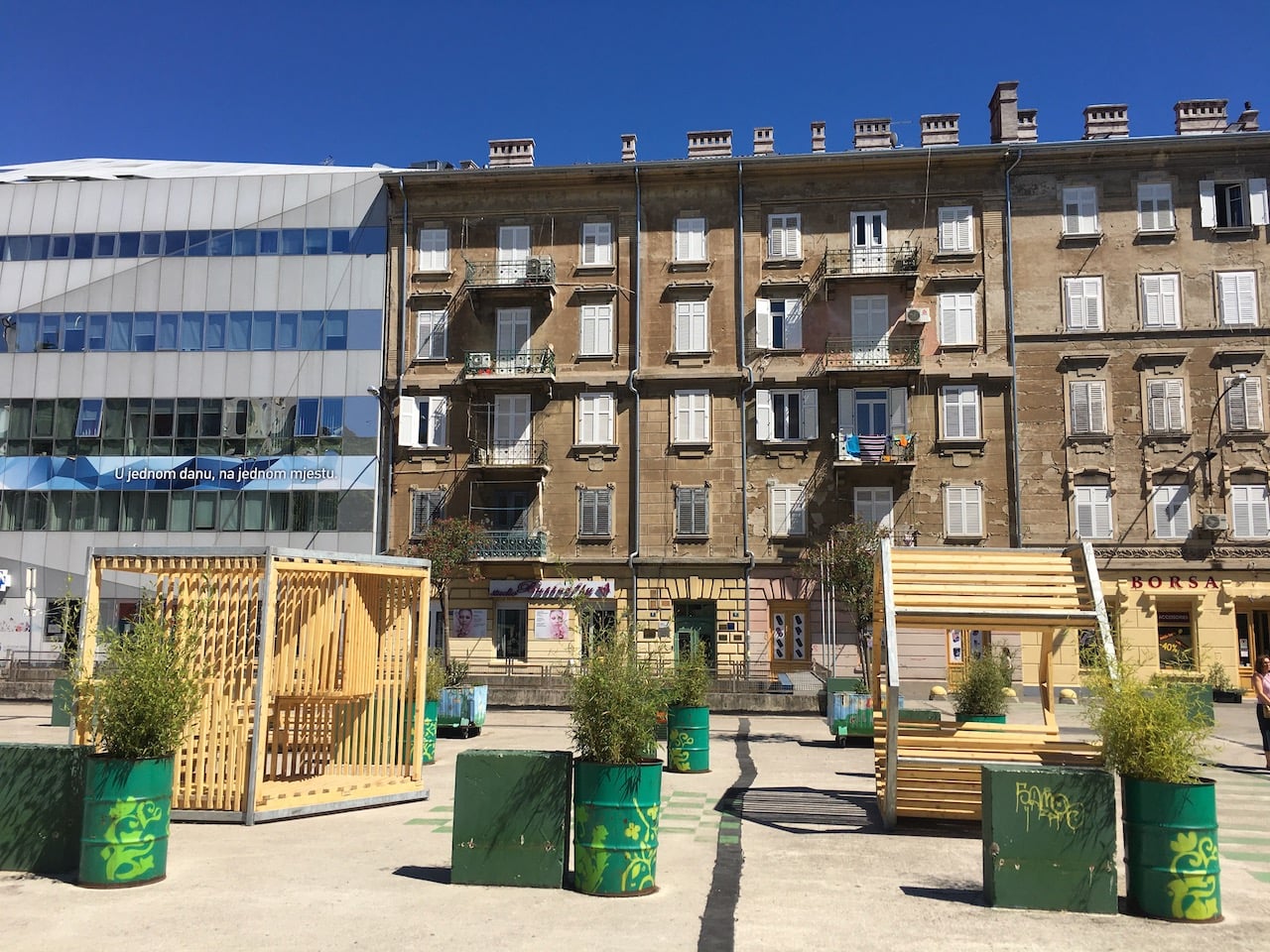
The Capital of Culture has never been awarded solely to help a city attract visitors. Nor is it ever intended to make its mark over just one year. A lasting legacy for the city's current and future residents is perhaps the most essential element of the event. And, though crippled by Corona, Rijeka European Capital of Culture 2020 is staying true to its promise to do so. New Rijeka urban parks and public recreation areas are just some of the benefits ECoC 2020 will leave behind.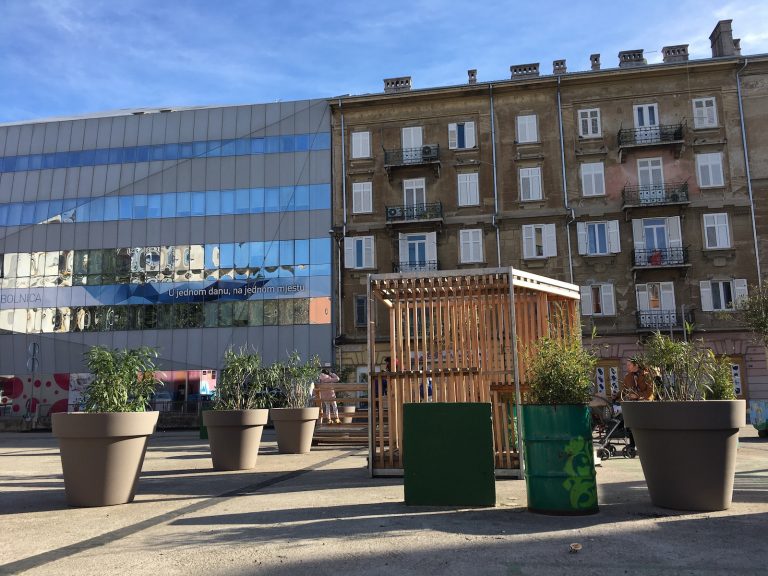
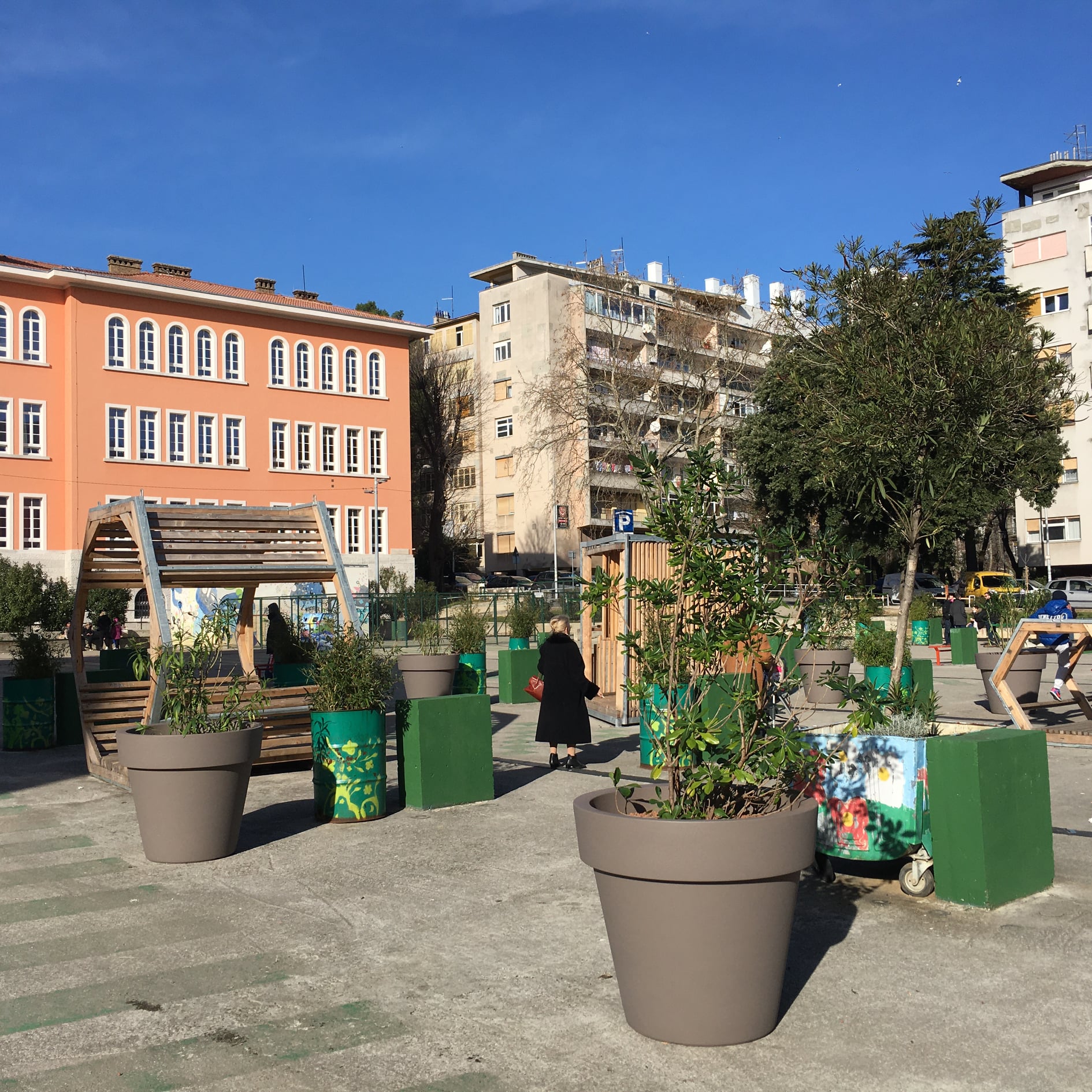
Rijeka is a great city. But, it's a weird place. An anomaly on the Croatian coast, it boasts none of the quaint olde worlde architecture you usually find around the Mediterranean, Croatia included. It's grand Austro-Hungarian facades and palaces are much more like the Croatian capital. Behind them the city rises sharply up into the foothills, modern residential blocks shooting skywards and peering over the centre below. As Rijeka has grown like moss up this hillside, little room has been left for greenery and areas of recreation. Goodness knows, the best spot you might find for a picnic in Rijeka is the cemetery! (Kozala – actually, as far as places full of dead people go, it's actually very nice)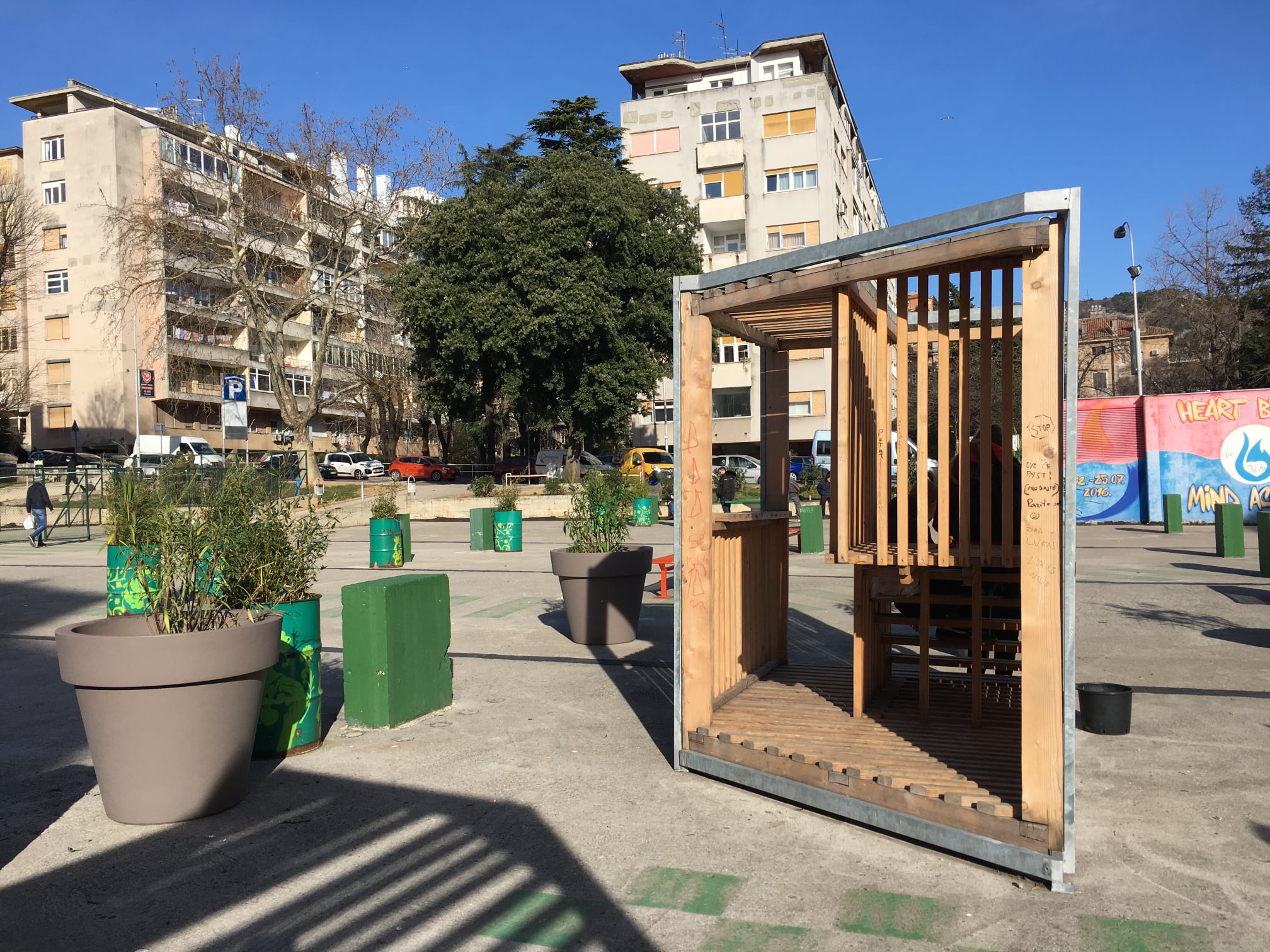
The new Rijeka urban parks try to address the imbalance of work to recreation space city residents have. While it may not be possible to create a vast landscape of lawns and a forest of trees in the city centre, the new Rijeka urban parks and public areas look to use modern solutions and the places they have, to create spaces where everyone can socialise, play, relax or meet up.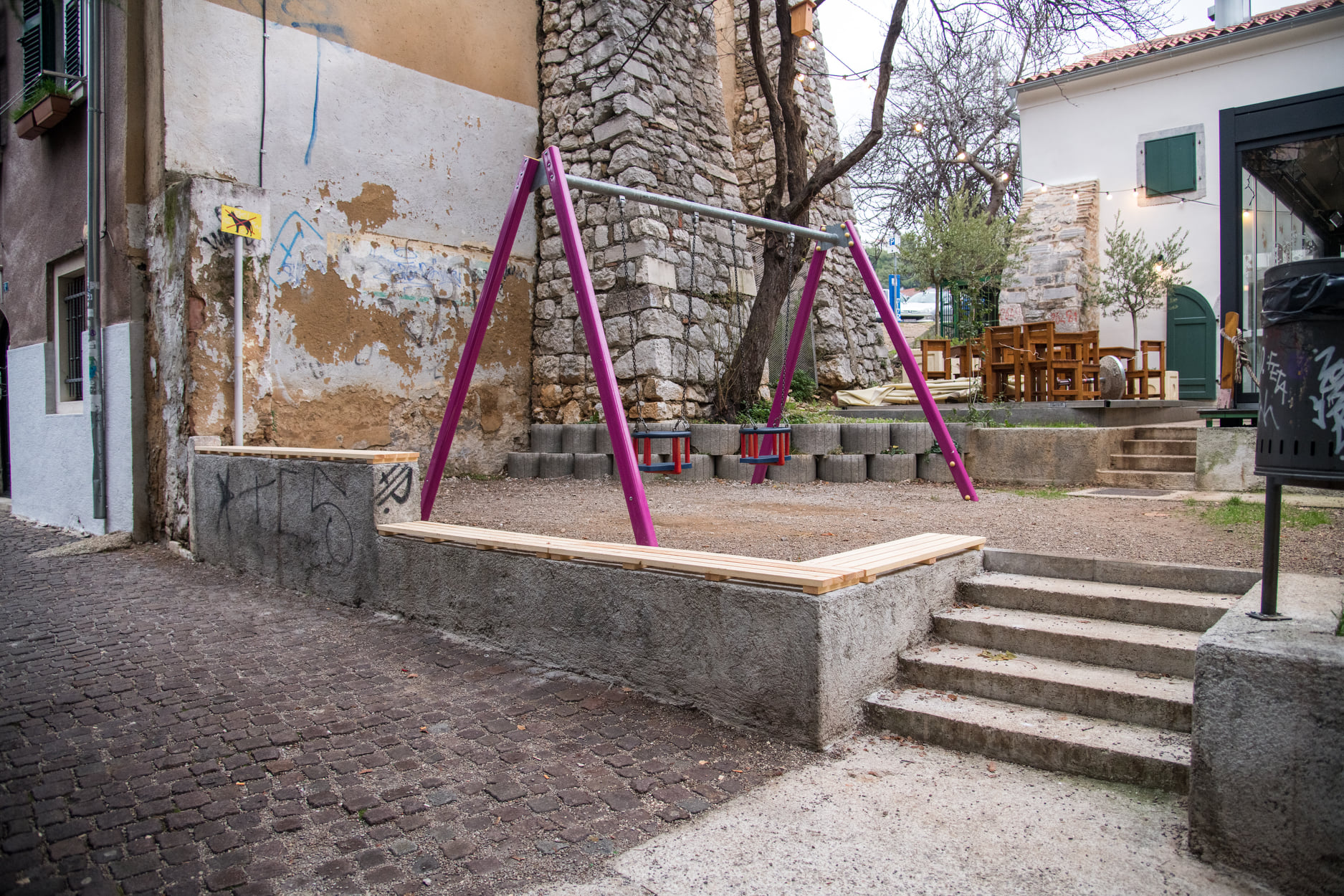
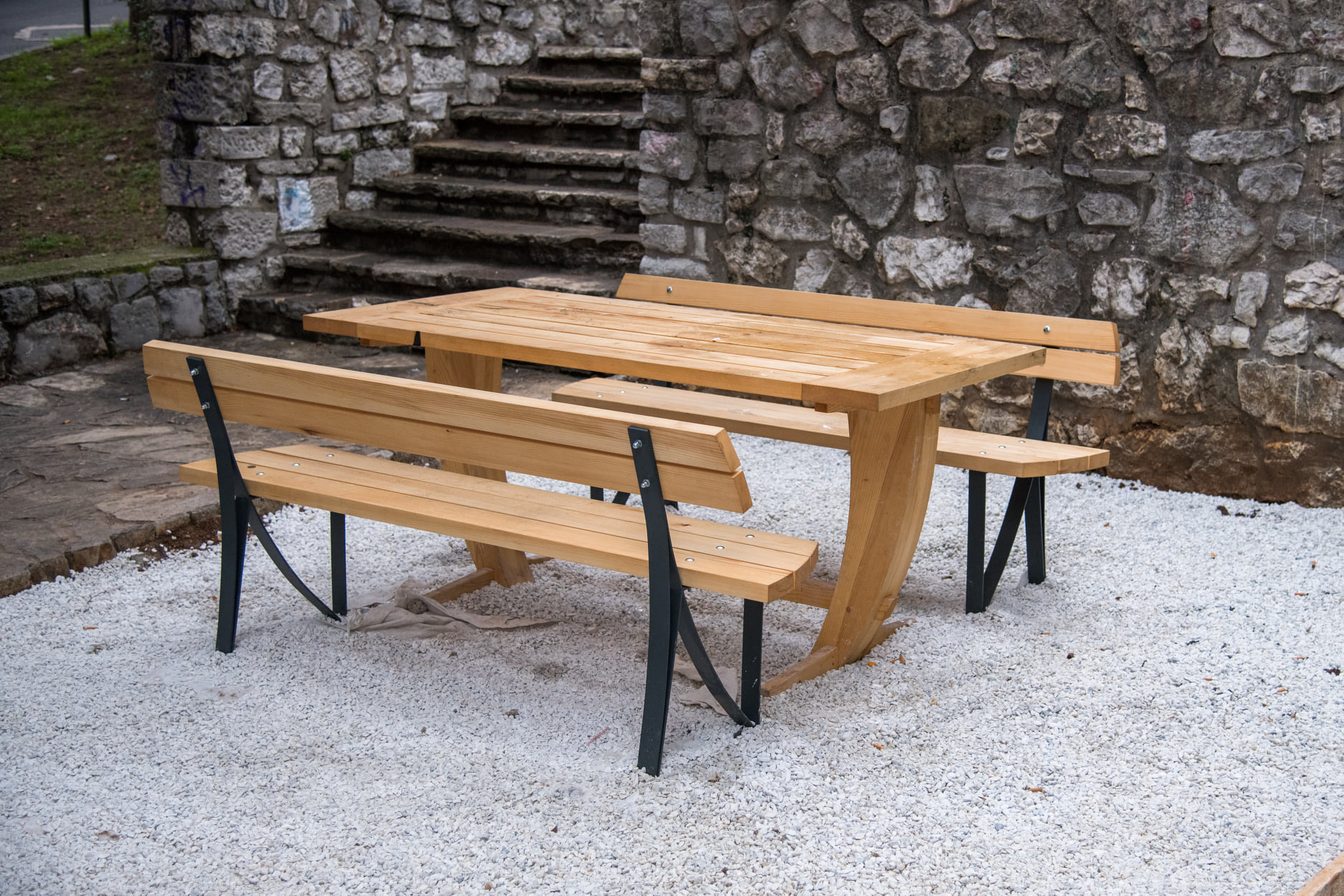
Under several different programs within European Capital of Culture 2020, members of the Association for the Promotion of the Quality of Urban Life 'Urbani separe' worked on the new Rijeka urban parks in July 2020 and again between December 2020 and January 2021. In a relatively short space of time, we think they've done a great job.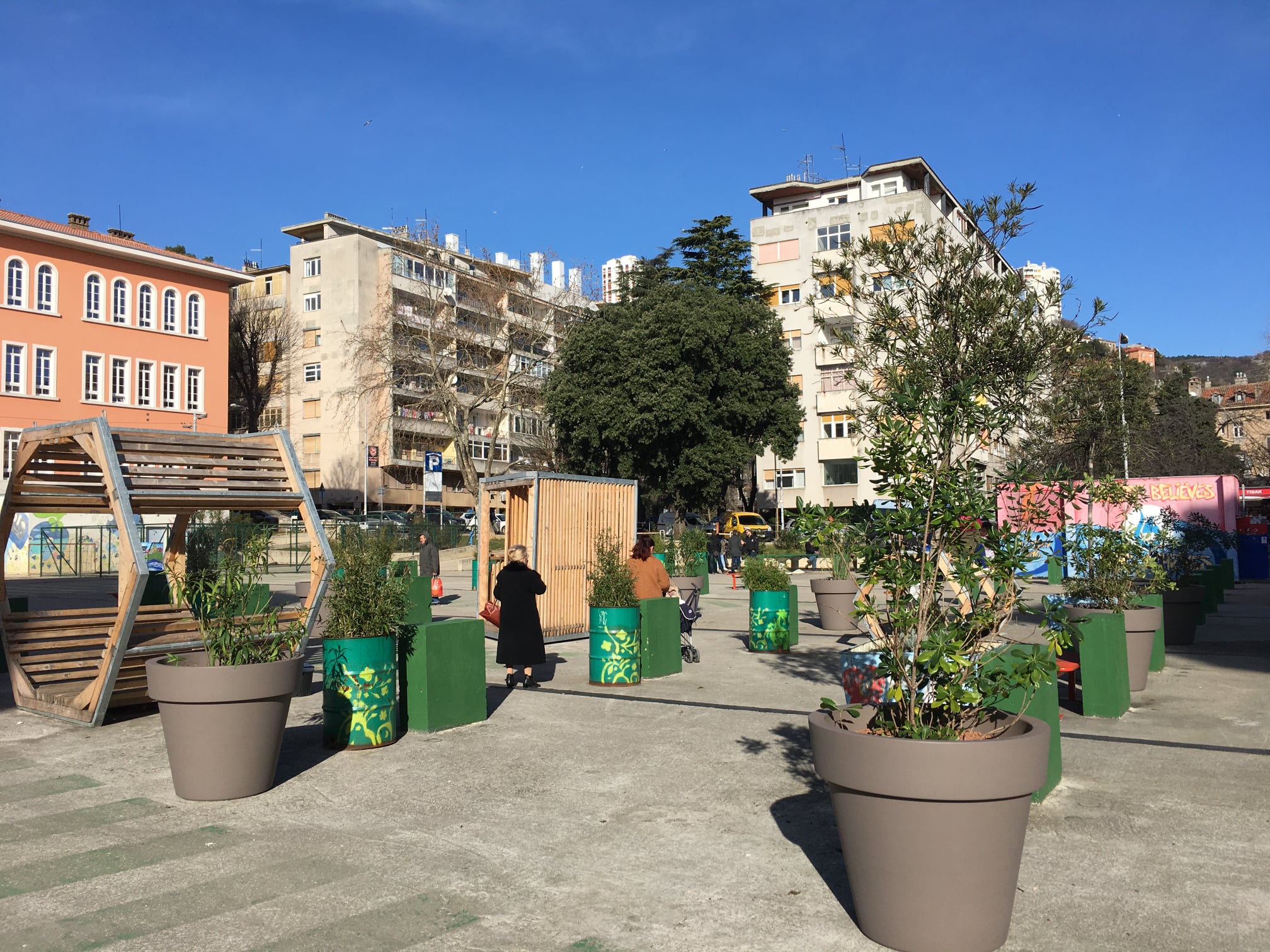
All images © Urbani separe / Rijeka 2020
European Parliament Endorses Extending European Culture Capital Status
ZAGREB, Dec 18, 2020 - The European Parliament on Thursday endorsed a motion to extend the status of European Capital status for the period 2020-2023 which enables Rijeka to present all the programmes it had planned but was thwarted by the COVID-19 pandemic.
With 689 votes in favour MEPs adopted a report by Croatian MEP Zeljana Zovko (HDZ/EPP) to extend the status of European Capitals of Culture in the 2020-2023 period, which gives Rijeka and the Irish city of Galway the "green light" until April 2021 to present their programmes while the next capitals will be deferred from 2021 to 2022 and from 2022 to 2023.
Rijeka and Galway were the European Capitals of Culture for 2020 however the COVID-19 pandemic thwarted them from presenting their planned projects.
After the motion was upheld at a plenary of the parliament in Brussels the Council is expected to confirm the decision next week so that it can take effect before the end of the year.
Ahead of the plenary meeting, Zovko underlined that extending Rijeka's status "in this turbulent time of the pandemic, Rijeka will have another significant opportunity to show that the culture sector has adapted to new circumstances and that creative power during the corona crisis can show what is most important in the creative industry and cultural heritage in promoting European values."
European Capital of Culture: Public Panel Held on Fate of Rijeka 2020
April 25, 2020 - The public panel 'European Capital of Culture - what to do?' was held regarding the Rijeka 2020 program. The discussion took place on April 24 via online chat service Zoom.
T.portal reports that the discussion was organized by Sanja Bojanic, Natasa Antulov and Marin Lukanovic from the Academy of Applied Arts, University of Rijeka, with speakers including Emina Visnic, director of Rijeka 2020 and Rijeka Mayor Vojko Obersnel, who spoke about the coronavirus impact on the European Capital of Culture, but also on culture in general.
The panel started with a statement by moderator Natasa Anutnov that a temporary suspension of the program was announced on April 17, and that 59 employees of Rijeka 2020 were laid off, while it was announced that the program was being restructured. She also confirmed that they had contacted the Ministry of Culture about participating in the panel, but no one had replied.
She asked Rijeka 2020 director Emina Visnic about what has been happening in her organization over the past month.
“First of all, I want to send a clear message: the ECOC as a project has not stopped nor has any of us who run the project said anything otherwise. Why speculations saying the opposite came up and why obituaries were written is another question, and I am personally interested in finding that conclusion,” said Visnic, who presented a calendar of activities undertaken since the crisis began. The ECOC, she noted, is much broader than Rijeka 2020 and touches many program partners.
Following the announcement of the program postponement on March 12 because of the decision by the National Civil Protection Headquarters, a discussion was held with partners leading larger segments of the program. The ban was estimated to last longer than previously announced, but at the time, they still hoped that work could begin by June. At the time, everyone thought that the virus would pass, but only now its impact is fully seen, and Visnic believes that life would not just return to normal.
'We had been planning this program for two years, and then in just one month, we had to change the framework urgently. The final program cannot be discussed now. Everyone asks, 'How much to cut, how much money?' And today we do not have an answer to that question because the Ministry of Culture should answer our inquiries next week," said Visnic, adding that most programs are in principle a public gathering, which will not be possible until June - and maybe later.
She further outlined all the activities they had undertaken in Rijeka 2020, all the conversations they had, and the suggestions they made towards the founders of Rijeka 2020, like hibernating the company and terminating activities or reducing workload, which was accompanied by reducing the number of employees. In the second variant, because canceling the project was rejected, the procedure was offered in two phases: the first, which they passed and which meant the said cancellations, and the second, to resume at the latest in June and July, which offers two variants, one with more and one with fewer programs.
The document was sent to the Ministry of Culture and Primorje-Gorski Kotar County, and it is not a final but a starting document, said Višnić, who also commented on the criticism that Rijeka 2020 has been invisible in recent weeks. The truth is, she confessed, that they had not communicated for two weeks, which she said she would take responsibility for if necessary. She added that the final version of the program proposal was made without a partner, which was mentioned as one of the main issues.
Mayor Vojko Obersnel estimated that thirty million kuna would be needed for the "new" ECOC, but that no one knows how much will eventually be provided to continue the project.
Along with him were Snježana Prijić-Samaržija, Rector of the University of Rijeka, Davor Mišković, Head of the Drugo More Association, Program Operator Dopolavoro, and Damir Čargonja, representative of Novi turizam d.o.o. and organizer of the Privremene Autonomne Zone program.
The talk, broadcast by Radio Roza, was also attended by numerous cultural figures and other interlocutors, from Vitomira Loncar, Aljosa Puzar, Ksenija Zec, Goran Sergei Pristas, Marcello Mars, Zvonimir Peranic and Daniela Urem to Irena Kregar Šegota, and formally linked to by the ECOC project.
The rector of the University of Rijeka, Snjezana Prijic-Samarzija, said that at this moment we must 'be hyper-ambitious'.
“We must not show the slightest weakness here. We should use all our strength because this is symbolic, Rijeka must not give up! We will all be guilty and responsible if we fail to return the ECOC to the fullest extent possible now,” she said.
Davor Miskovic of Drugo More, in charge of implementing the Dopolavoro program direction, presented his view of the current situation with a concrete example, but also considered the situation from a broader perspective and artists in Croatia and abroad.
“We did some projects for two years, the artists worked on them, researched, produced... We just needed to finish them. In some ways, together with our partners, we have said that we will realize them anyway. In any format - they will happen. The problem is with big spectacles involving a lot of people, as this is still unknown, it depends on the mode of our future lifestyle. The problem is also with the artists who had to come from, say, America or Canada, as that fell through, and Dopolavoro narrowed down significantly,” Miskovic said, describing the current situation as a gigantic crisis in culture.
Marcell Mars, one of the researchers at the Center for Postdigital Cultures at Coventry University, who worked with his colleagues on the 'Piratska skrb' project for Rijeka 2020, agreed. Mars sees solidarity as the only path to a concrete solution.
“Solidarity is the key. It is a question of survival and we need to put it as a key focus. We need to build a story that will have its basis in solidarity,” he said.
The situation was also addressed by Sergei Pristas, playwright and full professor at the Academy of Dramatic Arts, University of Zagreb, and co-founder and member of BADco., a performing arts collective.
“Rijeka is currently at a crucial historical moment, at the moment of redefining what culture is in the context of this moment. The focus should be on culture, not repertoire,” he said.
Ksenija Zec, choreographer and author of dance and drama plays and a professor at the Academy of Dramatic Arts in Zagreb where she teaches Stage Movement, gave her opinion on the topic of digitizing culture, which is increasingly mentioned in public because of the new situation, and explained that it is not so simple for numerous reasons.
“Digital art is not just a recording of a theater play," she said, adding: “Everything we do at the moment is a pledge for the future. The criteria should not be reduced, but the formats should be reduced.”
The sharpest criticism of all that was said in the official part, before the discussion, was addressed by Vitomir Loncar, who warned that there could be no gathering still in September or October.
“There are no suggestions for online activities in all your plans, which means you are not seeing the times we are living in. The presentations show that you act as if you have a decades-worth of time, the future, and the situation is long gone,” Loncar said, while Puzar and Čargonja referred in particular to layoffs for employees in Rijeka 2020.
“I was shocked by the dismissal of the workers, and I signed the letter. But I am also shocked by the letter, it is written as it is written, not too much is being asked for, but it is a disappointment to those people who lost their jobs and rebelled,” said Čargonja, adding that some who were listed as the signatories did not actually sign the letter. To the mayor's remark that most of them responded, "I don't know, but the generation has rebelled and wants to exercise their rights. That always had to be ahead of the rest.”
You can listen to the full panel discussion here.
To read more about lifestyle in Croatia, follow TCN's dedicated page.
European Capital of Culture: What Will Remain of the Rijeka 2020 Program?
April 15, 2020 - Rijeka's head of the Department of Culture, Ivan Sarar, discusses the impact of the coronavirus pandemic on the Rijeka 2020 program.
In these challenging coronavirus times, the cultural sector is strongly affected, but since it shares the fate of other sectors, it does not seem to enjoy much public discourse.
In this context, Rijeka is living a unique story. What was supposed to be a cultural feast in the year of the European Capital of Culture - when we expected to hold debates in ideological, sociological, ethical, artistic, critical-theoretical and other conversations - became the burial ground of culture where victims are collected.
Rijeka's head of the Department of Culture, Ivan Sarar, interviewed with Novi List to discuss the impact of the pandemic on the Rijeka 2020 program.
In an interview with Novi List, the Minister of Culture announced that the Ministry would not be able to pay the agreed financial support to the ECOC. What is the amount?
"It is still unknown how much the Ministry of Culture's financial support will be for the ECOC project."
In terms of the City of Rijeka's financial obligations to the ECOC, what, or how much, will be the issue?
"Over the past three weeks, the City of Rijeka, in response to the coronavirus pandemic, and in an effort to help outright disadvantaged private sector businesses, has taken a number of measures that directly affect the city budget cuts. Similarly, the measures were also adopted by the state, also with regard to reducing the liabilities of the economic sector, which also has a direct impact on filling the income tax budget. So there is only one thing in such uncertainty: there will not be as much funding for the ECOC program as originally planned. And it is impossible and ungrateful to give concrete figures at this time."
Rijeka 2020 announced the restructuring of the program. What are the requirements of the Rijeka Department of Culture in terms of deadlines? When does Rijeka 2020 have to come up with a new proposal and in what direction will it go, to your knowledge?
"The program, which began on 1 February 2020 and was to run until 31 January 2021, is planned, prepared and organized over four years. Now it needs to be redesigned, significantly reduced, revised to over 250 program activities that originally had to include more than 600 events in a very short time.
Basically, a significant reduction in the overall budget should have been foreseen, but through certain logical criteria that we discussed earlier. Rijeka 2020 completed this first revision this week with several possible scenarios.
I was personally involved in this review, the first proposal was also submitted to the City and will be sent to the Ministry of Culture. It is certainly not the final document, and it does not constitute a definitive list of the programs of the "new ECOC", but is the basis for further discussions between the City, Ministry, PGZ, Rijeka 2020 and the partners involved.
The biggest challenge we all face is not really the number of programs or funding, but the total uncertainty surrounding the pandemic, which cannot be influenced by anyone, and it directly concerns the number of programs and future available resources and the timeframe for implementing any programs withheld. I'm saying that it concerns the audience themselves on those programs. Because it is perhaps crude to predict when the situation will normalize, it is much harder to predict the extent to which people will regain old habits and what their behavior will be, but also the expectations of citizens."
Are the infrastructure investments of "Bencic", "Galeb", and "Exportdrvo" in question? Are the European funds for "Bencic" and "Galeb" in question?
"So far, infrastructure investments are not in question. They have their own dynamics of work and payments, they are financed with significant amounts of EU funds and there are no major problems in this part of the project. The Sugar Palace and the Children's House are already in an advanced stage of construction before all work is completed.
We are facing smaller mobility issues and smaller delays in the delivery of materials and parts that have been ordered from abroad, but it is likely that these facilities will not be open to the public before the termination of the measures of reduced social contacts, or before the real possibility of offering ongoing program activity."
How much has the City of Rijeka disbursed approved funds to the users of Public Needs in the Culture of the City of Rijeka for 2020?
"There were no payments for public needs this year."
What is the debt of the City of Rijeka regarding the public needs before 2020?
"The City of Rijeka's debt to the beneficiaries of the 2019 Public Needs Fund is HRK 315,000."
What policy will you take to maintain approved programs, which have all been delayed, and disbursing funds for approved programs?
"The budget for public cultural needs for 2020 is around HRK 3.5 million. Given the liquidity of the overall budget in the new circumstances, we will strive to maximize payments for all programs held so far, including debt for the previous year. With regard to approved programs, it is certain that due to a budget deficit, we will have to go for a reduction in funding. We are just finalizing the priority criteria by which we will reduce program resources. We intend to maintain stability within the cultural sector in such a way that priority will be given to associations that have employees, freelance artists and all those projects where the financial structure suggests the existence of existential well-being for actors in the urban cultural scene."
What are the budget estimates for next year's Department of Culture, given the new situation with the coronavirus crisis?
"It is impossible to predict the budget for 2021 at this time; we still do not have any input from which to know what the financial framework is. The only certain thing is that it will be very tight. But it's too early to say how much.
We are currently considering urgent measures to run the projects as normal in the current year, as well as considering several models for the survival of the ECOC as Croatia's largest cultural project."
What measures are you taking in the Department of Culture to protect self-employed artists, small businesses in the cultural and creative sectors, and the self-employed, whose livelihoods are already threatened?
"Measures have been adopted on a city-wide basis for all those who cannot work in these conditions. The mayor also announced the possibility of extending measures to monitor the situation. These measures now relate to deferrals and write-offs - rents, utility bills, monumental rents, surtaxes and more. I partly answered this question in my earlier answers, as well.
As far as the self-employed are concerned, the City of Rijeka has not foreseen direct financial assistance in any crisis measure so far. We are in intensive communication with the Ministry of Culture, which has opened several lines of measures to assist the self-employed so that we can eventually contribute to this segment. The problem in this is the considerable clutter in the records as well as the very difficult job of defining the criteria for assistance that should be determined on a case-by-case basis.
On the other hand, this topic is, to a considerable extent, actually emerging from the cultural policy domain and entering the social policy domain. But I repeat, we will certainly do our utmost to maintain the continuity of payments to all who fall into the domain and have described your matter through the payment of public cultural needs. We are working on the decision to introduce rent-free studios and cultural associations."
Will there be any changes in the staffing structure of the Department of Culture and will salaries will be reduced in both the Department and public cultural institutions that are under the jurisdiction of the City of Rijeka?
"As things stand now, given the real state of budget cuts caused by this situation, it is likely that salaries will be reduced at the level of the city government, both in the city administration and in budget users and in Rijeka 2020."
To read more about lifestyle in Croatia, follow TCN's dedicated page.
Rijeka and Brighton: Brief Comparison Prompted by Opening Day of Rijeka’s European Capital of Culture Year
March 3, 2020 - It was almost 20 years ago to the day that I first came to Croatia, more specifically to Cres, Opatija and Rijeka. I was here to write a travel piece for a Brighton based magazine for which I was the production assistant – when the editor called out across our office “who wants to go to Croatia for a week?” I stuck my hand into the air eagerly although not being 100% sure about where I’d be going. On that trip, I experienced a tiny piece of Croatian life and the Rijeka Carnival and was greatly impressed. In 2003, I left Brighton and Hove (the city’s full title) and moved to Rijeka.
In the following years, I visited many parts of the country but I always thought that the city was different and even the Croats I met on those trips told me that Rijeka stood out as being alternative.
From music to art to literature this city has proved this to me with the opening of the Rijeka 2020 – European Capital of Culture (ECoC) this February and it made me realise that Brighton and Rijeka have several things in common so I put together a list:
1. They are both cities by the sea – south of their capitals - obvious I know. Brighton is the closest big city to London and a huge tourist destination. Rijeka is Croatia’s third-largest city, not, unfortunately, a big tourist destination, however, in the past, it was a very important industrial and transport hub and with ECoC and all that this investment, opportunity and status will bring, it now has much more potential.
2. Theatres – both cities have theatres that came into popular use in the late-19th century. In Brighton the Theatre Royal and in Rijeka the Croatian National Theatre Ivan pl. Zajc. In each city, there is also an unused venue. Rijeka’s Opera hall was recently opened for the opening day of ECoC when several rock bands played well into the night and it has recently hosted a dance event, which will surely boost its rejuvenation. Whilst in Brighton the Hippodrome’s future is still in the balance. Both these venues have seen better days during their century-long lives.
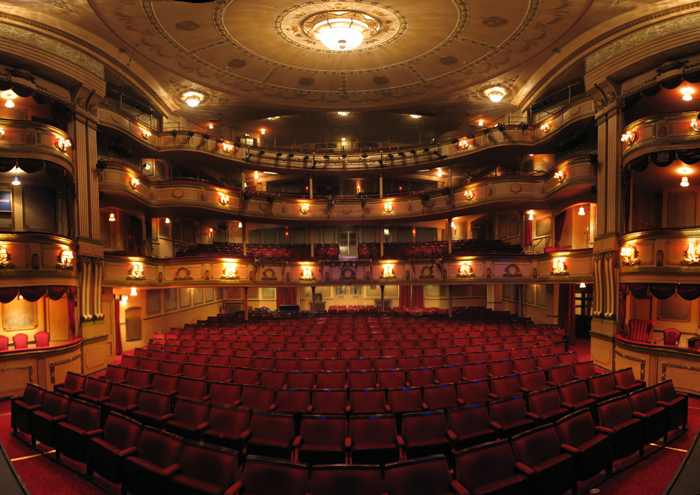
Brighton’s Theatre Royal
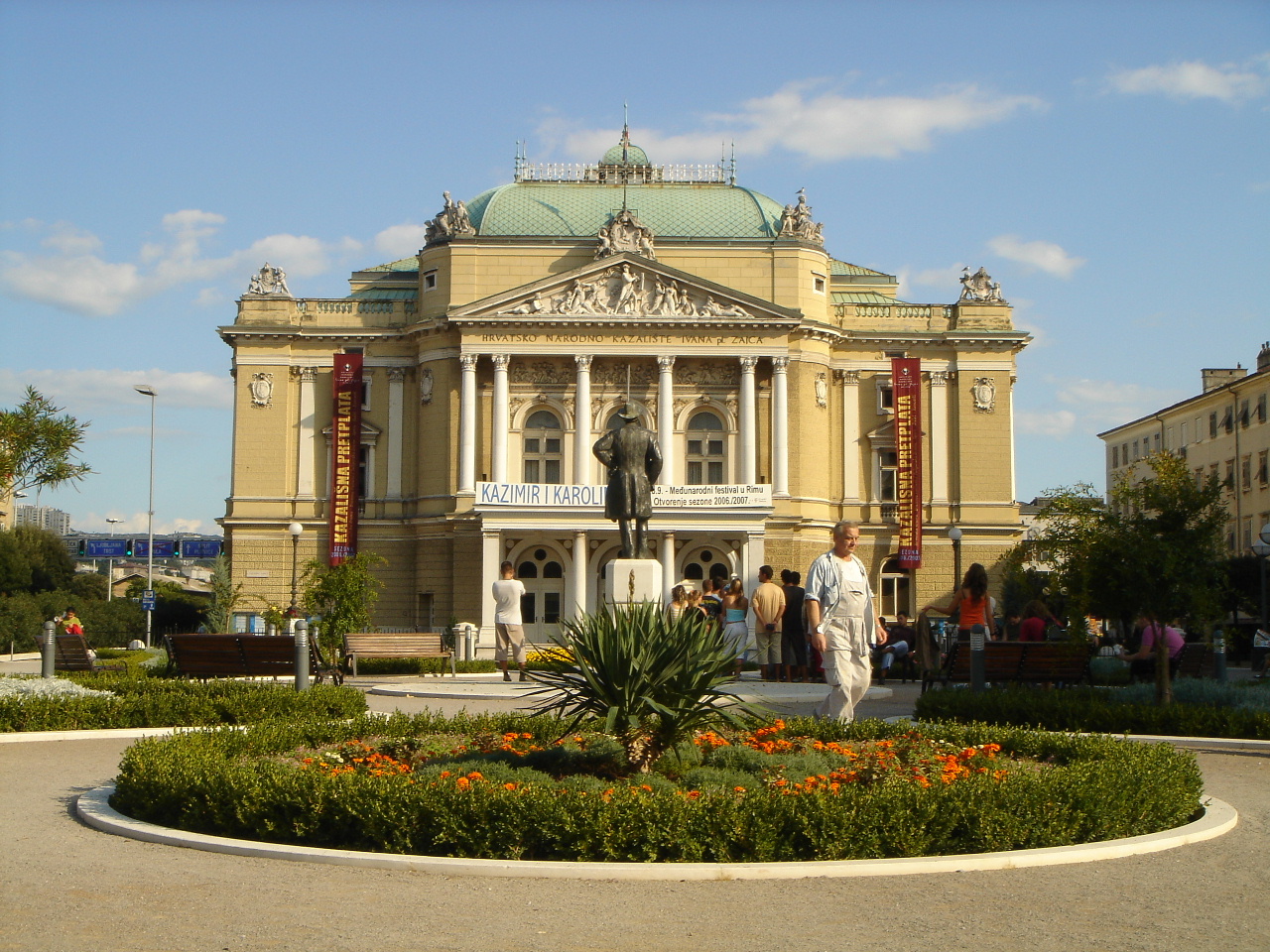
Rijeka’s Croatian National Theatre Ivan pl. Zajc
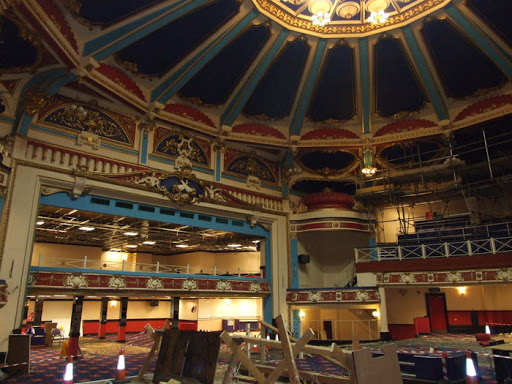
Brighton’s Hippodrome Theatre
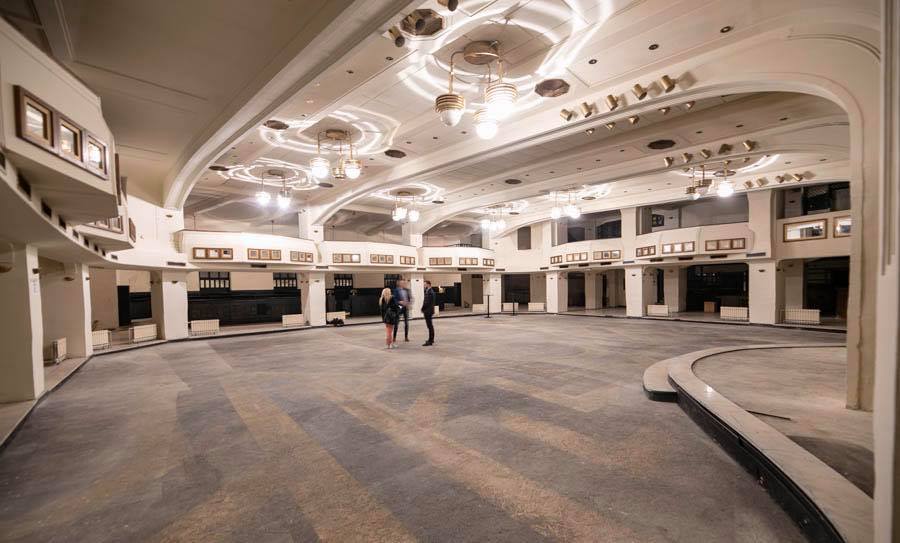
Rijeka’s Opera hall
3. Both cities have old original cinema theatres. The Duke of Yorks picture house in Brighton is an art-house cinema. It was one of the first in the world and was opened in 1910. It has experienced many lows and highs over the years but has survived and today it is still the oldest working movie theatre in the UK. Rijeka has Art-kino, which under a different name was founded about 1928 and then went through many variations and premises over the decades. The movies were incredibly popular in Rijeka, with films being shown from all parts of Europe, America and the Soviet Union. In fact, at one point in time Rijeka country had more cinemas screens than any other town in Croatia (45) and in the first six months of 1950 more than 750,000 cinema tickets were sold in the city. A law was even in force at the time which meant that the sale of tickets by touts outside before a popular film was screened became a criminal offence – those found guilty were fined, imprisoned or even expelled from the county! During Rijeka 2020 ECoC there will several locations arranged for open-air film screenings around the city and even on the roofs of tower blocks. Brighton also has open-air cinema shows during the summer.
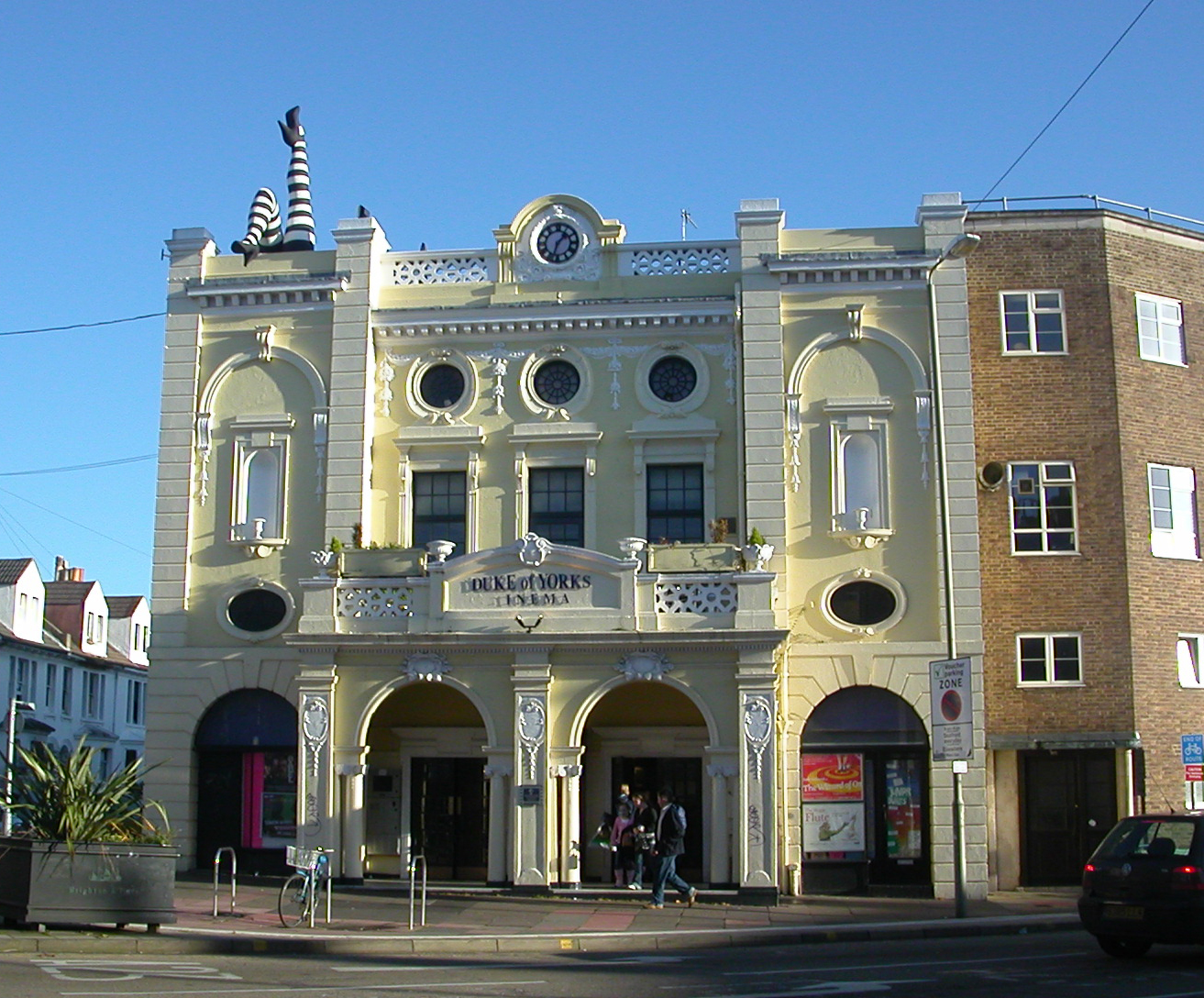
Brighton’s Duke of York’s Picture House
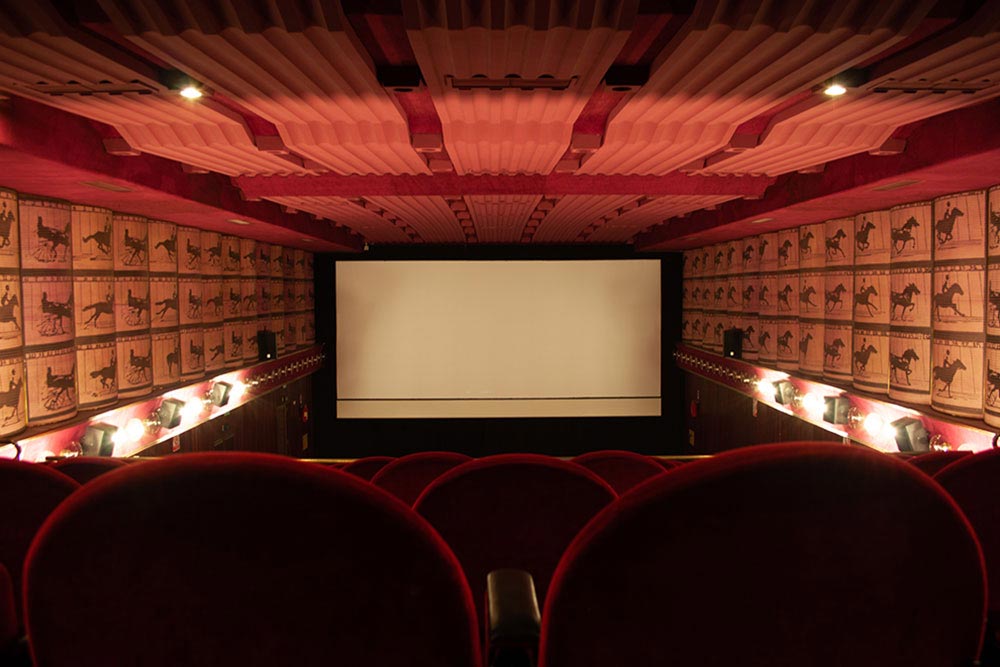
Rijeka’s Art-kino cinema
Both cities also have multiplex cinema complexes, however, these two small independent art-house cinemas have survived where other theatres have disappeared or been repurposed, and they still draw in the crowds.
4. Graffiti and murals. Both cities are adorned with murals and let’s say artistic graffiti. With tasteful and professional illustrations buildings, parks and other public spaces can be really brought to life, enhance the image and even become talking points and landmarks of towns and cities in place of drab, grey, depressing, crumbling structures. During Rijeka 2020 ECoC there will be an international festival of murals and street art will appear around the city painted by local and foreign artists.
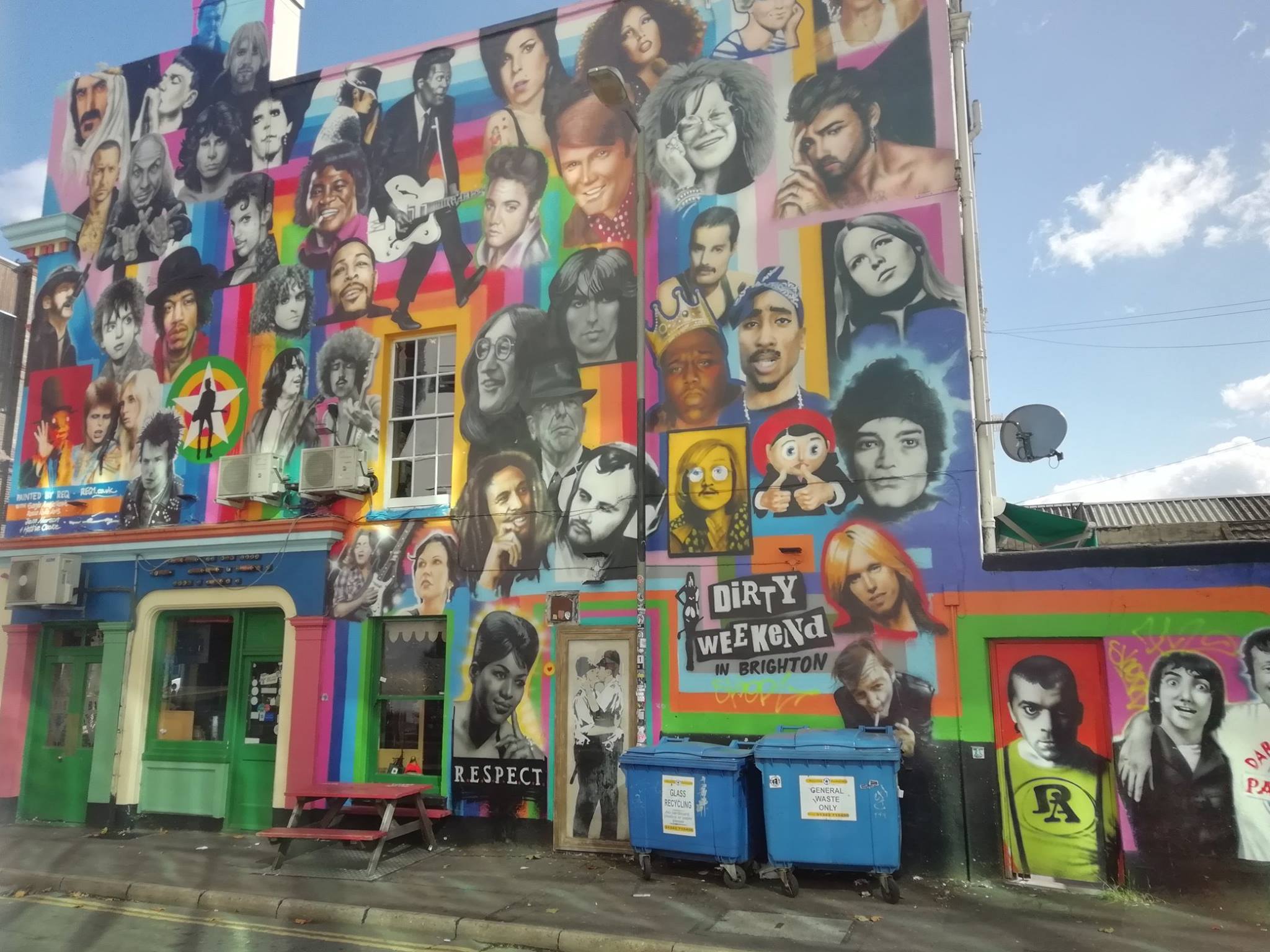
Mural on Brighton’s Prince Albert pub features famous departed musicians and singers. More and more every year, unfortunately.
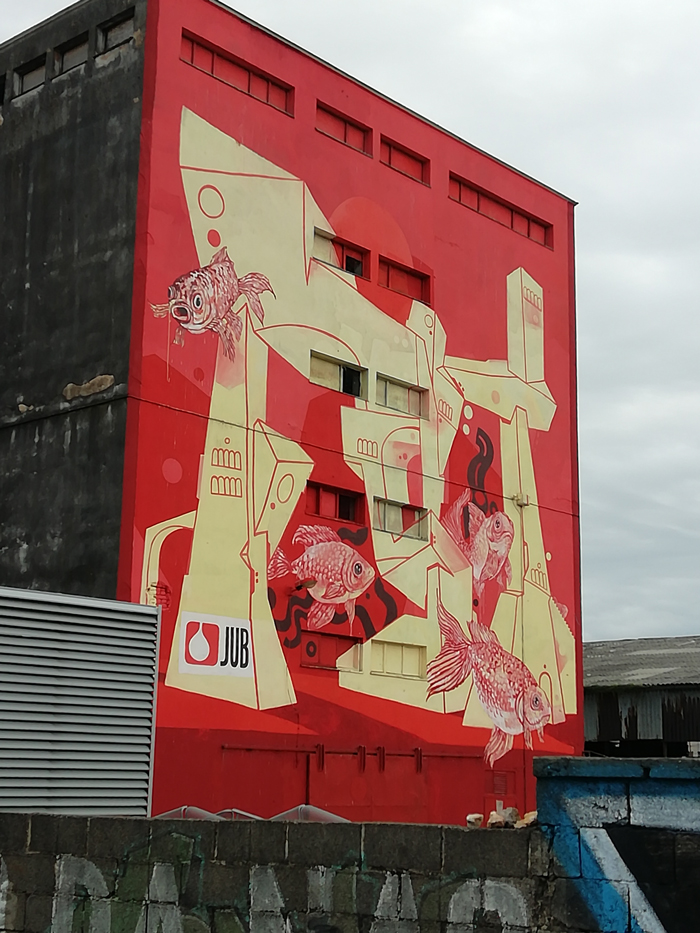
New mural on the wall of the IVEX building in Rijeka
5. Rijeka was and still is a centre of new music. In the 60s the first rock bands in the former Yugoslavia emerged here, in the 70s and 80s punk and new wave groups such as Paraf flourished. Later in the 90s and early 2000s, the club and dance scene was led by the Fun Academy and Quorum Colours. Brighton has always been an innovative place for new music. In the late 80s and 90s, it was a key place for the emerging dance and rave scene, which I really enjoyed. In the mid-90s I played bass in a rock band. My friends and I did it for the joy of music – we didn’t expect to be famous – we weren’t – but like so many others we did it for the fun of playing. 3-4 times a week we went to gigs, in pubs and clubs. This is similar to the feeling I have in Rijeka now – there is a varied musical scene, from flamenco to bluegrass and I have got to know several musicians by helping them with their English language as well as reminiscing about the heady 90s rave scene and concerts by bands that people here would have enjoyed seeing. Of course, all the musicians I’ve met here are much more proficient and professional than I was back then. One particular star from Brighton, Fatboy Slim has played in Croatia several times and Nick Cave, who is immensely popular in Croatia lived there more many years (bumped into him twice in Brighton’s shops).
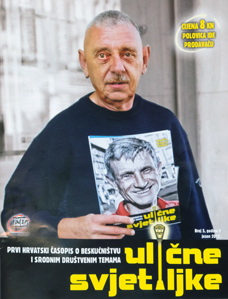
6. Brighton is one of the key centres for the publication of The Big Issue magazine which was established in 1991 to help homeless people get back on their feet and make a small living from writing and selling the magazine. The Big Issue was one inspiration for Rijeka’s own magazine called Ulične svjetiljke which is now sold throughout Croatia.
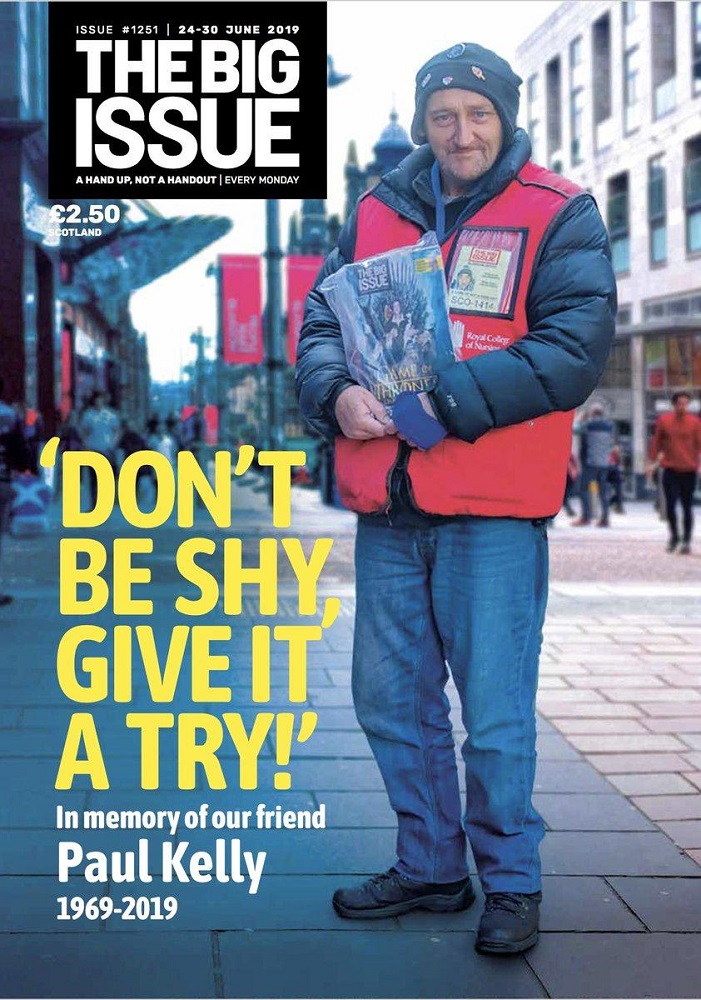
7. Universities – both cities have renowned universities and big student populations. Several campuses and faculties are spread around each city. The students’ energy and enthusiasm are a constant drive in both communities. And of course, with large numbers of students come festivals and events to cater for them. Rijeka has the multi-day Student Day Festival – the largest in the region, which has just celebrated its 10th anniversary. It features cultural, educational, sports, humanitarian, entertainment and scientific events for up to 40,000 students from Rijeka, all over Croatia as well as nearby countries. The highlight being the weekend of free concerts in the very centre of the city featuring famous local names – something that made me reminisce of student gigs back in the early 90s in Brighton.
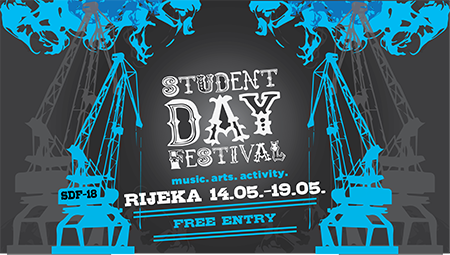
8. In Brighton the culture of recycling is firmly established. It is the only city in the UK which has a Green Party Member of Parliament. In the city, every household has separate bins for each kind of waste that is then collected by the council and dealt with. The City of Rijeka is trying – with separate containers for waste plastic, paper and glass for each neighbourhood, and it regularly distributes leaflets about how to cut down on unnecessary waste and raise awareness of recycling. Recently the city received more money from the government for the expansion of its recycling facilities. There is also one excellent initiative in the city called Riperaj, which is Croatia’s first repair café. It was opened in late 2019 and offers its citizens a free repair service (excluding any necessary spare parts) for their household electrical items and furniture and anything that would otherwise be thrown into the rubbish and end up in a landfill. It also offers a programme of workshops for everyone who wants to learn more about recycling and repairing household equipment. Repair cafés are a rapidly worldwide growing concept. Brighton also has its own Repair Café which was opened in 2012. During ECoC there are several green initiatives, such as Zeleni Val, beginning in Rijeka including the conversion of previously unused roofs of tower blocks into gardens and the greening of deserted areas owned by the city. Something that the local communities are invited to get involved with.
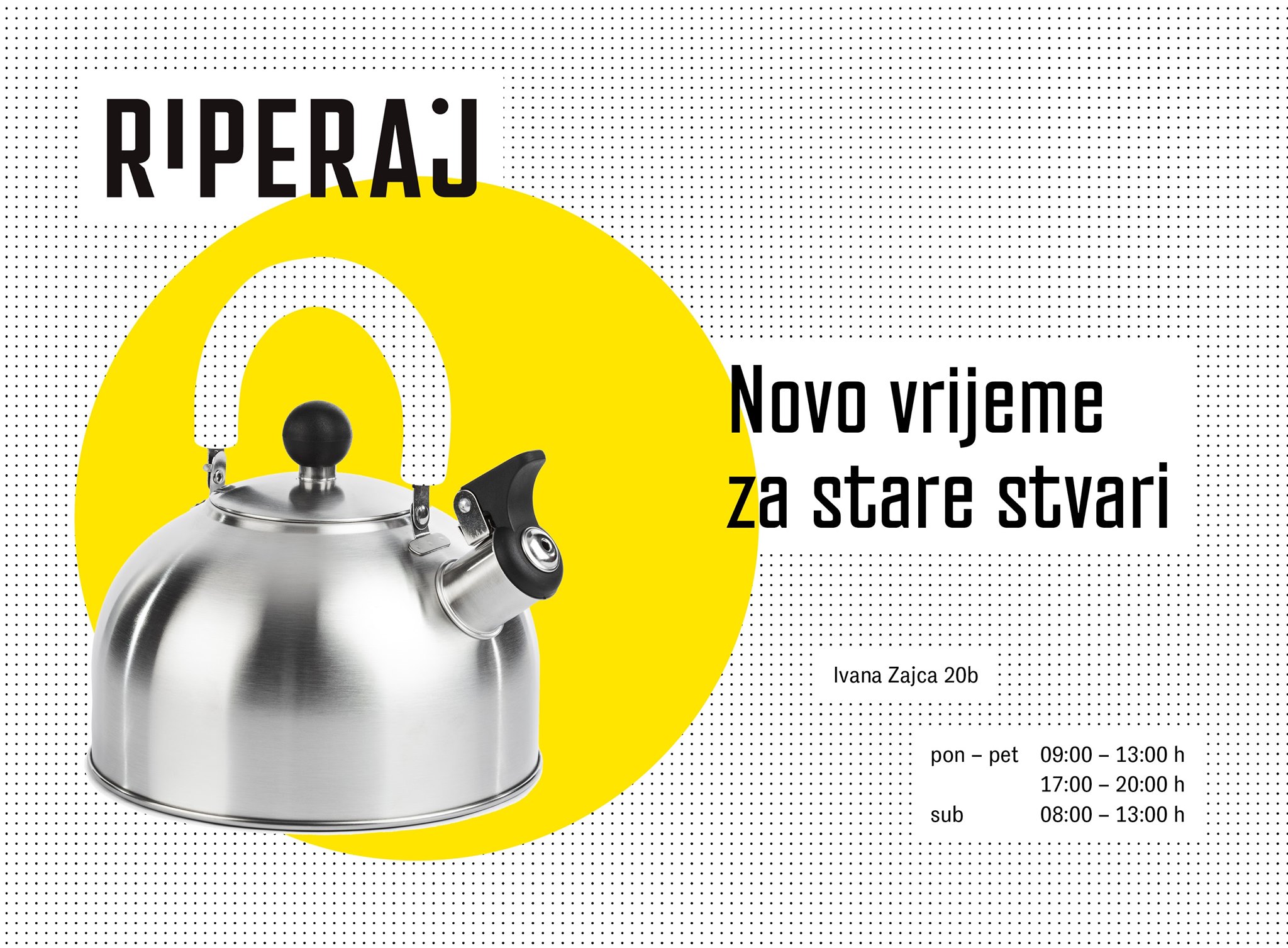
There are many other ways which Rijeka could also benefit from sustainable and renewable energy. Off the coast of Brighton, there is a massive wind farm with more than 100 windmills. Imagine the electricity which could be generated when the fierce “bura” wind blows!! Solar power too when considering the number of sunshine hours which the Adriatic Sea enjoys – in fact, a solar power plant on the nearby island of Cres is due to be constructed.
Recently the Port of Rijeka was given a waste collection device – the Seabin – the first in Croatian waters. This simple, inexpensive bin for collecting surface waste is a global initiative that aims to clean up the water around harbours and ports.
9. Brighton has a very big gay community. The Brighton Pride Festival is the largest and proudest LGBT event in the UK with an average of 450,000 attendees every year. Although Rijeka does not come close to this kind of event, it is important to note that in 2013 the people of Rijeka voted against the proposed Article 61 of the Croatian Constitution which was upheld nationally as proclaiming that “Marriage is a living union between a woman and a man” - effectively meaning same-sex marriage is unconstitutional. Croatia’s first lesbian organisation - LORI - was established in 2000 in Rijeka and it supports the rights of the LGBT community in society. During ECoC there will be the annual Smoqua festival of LGBT culture which will feature performances, a concert, an exhibition, artist and activist interventions in public spaces, workshops, panel discussions and other activities in order to introduce visitors to the importance of queer and feminist history and it will be attended by participants from around the world. Just recently, in 2019 a new website, aimed at gay travellers and tourists was launched by a woman from Rijeka – gaytravelcroatia.net. Since living in Rijeka I have met many friendly, open-minded people of all generations from school children and pensioners, artists, writers, musicians and professors with whom I share the same passions, opinions and positive outlooks as those I know back in Brighton. Although the two cities do not share similar histories, I think that Rijeka’s past has only added to its diversity and tolerance for others as well as the desire for change and improvement.
10. Both Rijeka and Brighton like to feel as though they are different and independent. People visit Brighton for a weekend away, for the arts, nightlife and shopping. The community feeling is very close. In the 2016 Brexit referendum 68% of Brighton’s residents voted to remain in the EU. For me, Rijeka too has a similar feeling - immediately after the ECoC opening ceremony on the blackboard of a popular bar in Rijeka – Caffe la Guardia - whose daily pearls of wisdom over the years have been highly amusing and succinct, stirred up some reactions - read into this what you will.…..
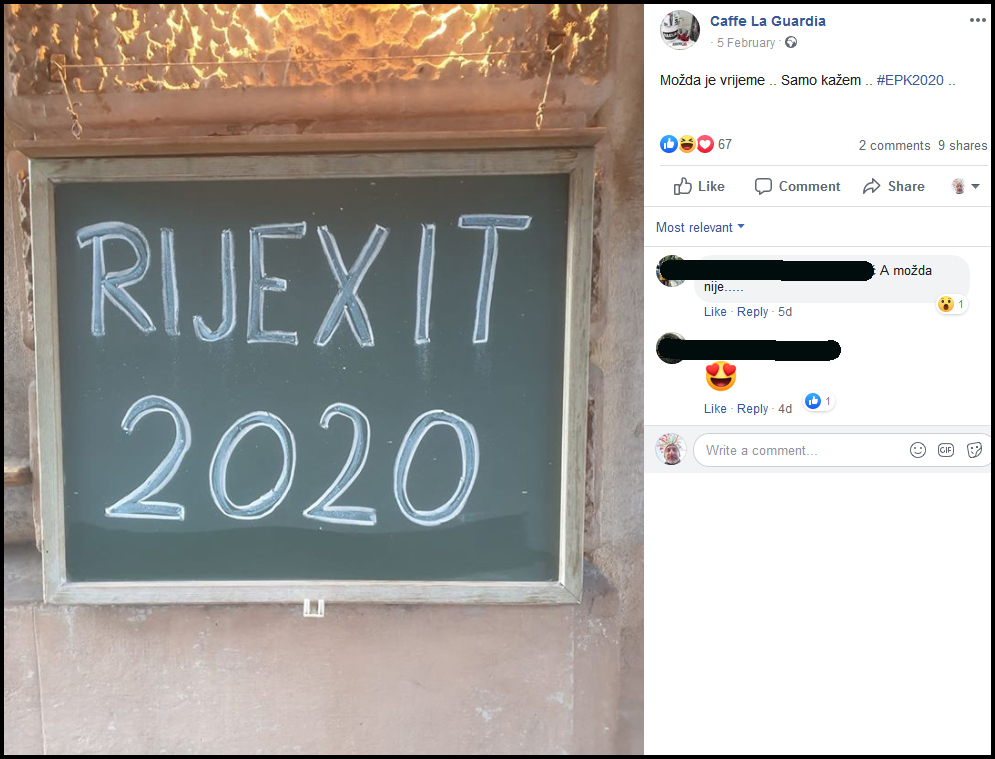
Of course, this is just a quick list of things that immediately came to my mind after enjoying the opening ceremony of Rijeka’s year of holding the title of European City of Culture – many people I spoke to in the days following that day agreed that Rijeka should have a similar, although more modest, event every year. The year-long programme and the lasting effects after 2020 could be the initiator for a new annual Rijeka festival – RiFest (?) which would bring extra energy and interest to the city just like Brighton’s world-famous Festival.
Late February saw the annual Rijeka Carnival Parade through the city centre. An extra special event this year to celebrate the European Capital of Culture, and something that I experienced 20 years ago on my first visit to Croatia. Every year I am always impressed by the effort, ingenuity and joy that its people can create and in doing so make it unique – just like my previous home of Brighton.
So Rijeka, in the words of your own annual carnival slogan may you always “be what you want to be.”
To read more about travel in Croatia, follow TCN's dedicated page.
Traditional Bell Ringers in Matulji Part of European Capital of Culture Programme
ZAGREB, February 23, 2020 - A festival dedicated to the tradition of bell-ringing in the area of Rijeka is taking place in the municipality of Matulji on 21-25 February within the "Bells and Nothing Else!" programme, which is part of events celebrating Rijeka as the European Capital of Culture 2020.
"Bells and Nothing Else!" is a programme which brings together 22 local council committees of Matulji, a community northwest of Rijeka.
The traditional carnival processions in Matulji, as the local annual carnival bell ringers' pageant from the Kastav area, are part of UNESCO's list of intangible heritage.
During the January carnival period, bell ringers march through the villages that dot the Kastav region. Clothed in sheepskin throws with bells around their waists and sporting distinctive hats embellished with sprigs of evergreen, two to more than thirty ringers swagger in groups behind a guide carrying a small evergreen tree.
Groups may also include theatrical characters such as a prankster ‘bear’ who regularly escapes the control of his two 'guards', according to the description on UNESCO's website.
"With variations distinctive to each village, the annual carnival bell ringers’ pageant is a way to strengthen bonds within the community and a valuable means of renewing friendships among the towns in the region while integrating newcomers into its traditional culture."
During this year's marches, cooperation has been developed with the Academy of Performing Arts and the Department of Alternative and Puppet Theatre in Prague, the organisers of the "Bells and Nothing Else!" festival say.
More news about the European Capital of Culture can be found in the Lifestyle section.
Rijeka Selected in Top 10 Best European Destinations 2020
February 8, 2020 - Rijeka has been selected in the top 10 European destinations to be visited in 2020.
Namely, Glas Istre reports that although it was not selected as this year's most desirable European destination conducted by European Best Destinations, a European organization based in Brussels, Rijeka is listed in the Top 10 European Destinations in 2020, based on votes from travelers from 179 countries around the world.
From January 15 to February 5, millions of travelers and tourists from all over the world voted for their favorite destinations, and Rijeka competed for the title of Best European Destination in 2020 with about twenty European tourist destinations, including some of the most famous, such as Paris, Berlin, Madrid, Rome and Prague. The Croatian city ranked eighth.
“This impressive high ranking is the result of year-round continuous work of the whole destination and proof of Rijeka's better positioning on the world tourism map.
Voters have recognized the Croatian city as a destination with a powerful identity and multiculturalism, which fully justifies the slogan of the European Capital of Culture - Port of Diversity in which each visitor will find something for themselves.
Numerous events throughout the year have turned Rijeka into one of Europe's best city break destinations, and this is a great result,” pointed out the Rijeka Tourist Board and said - if you haven't already, pack up your suitcases and come to the European Capital culture, into a city where you can be whatever you want!
The Croatian city competed against 19 destinations, including Paris, Prague, Rome, Madrid, Reykjavik, Rotterdam, Colmar, Athens, Sibiu, Namur, Menorca, Heviz, Cascais, Tbilisi, Bydgoszcz, Vienna, Cork, Rochefort and Rotterdam.
Maximilien Lejeune, President of the European Best Destinations Organization, states that they were honored and proud that Rijeka was part of the eleventh edition of this competition. He pointed out that Rijeka is a unique city that offers travelers real experiences.
The selection is conducted by European Best Destinations, a European organization based in Brussels. The best European destination has been selected since 2009 to promote tourism and culture in Europe, in cooperation with more than 300 partners of tourism offices and the European Destinations of Excellence (EDEN) network created by the European Commission.
To read more about travel in Croatia, follow TCN’s dedicated page.
Plenković: Government Strongly Supported Rijeka as European Capital of Culture
ZAGREB, February 7, 2020 - Prime Minister Andrej Plenković on Thursday congratulated Rijeka on a recent ceremony inaugurating the city as the European Capital of Culture, saying that over the past few years the government had strongly supported the project and there was therefore no room for speculation that the government had any reservations about that.
"There have been many bizarre comments in the media. Over the past few years the government has not only provided strong financial support for the European Capital of Culture project but has been quite involved in the project and supported its activities," Plenković said at a government session.
The PM said that the inauguration ceremony was attended by Culture Minister Nina Obuljen Koržinek, Tourism Minister Gari Cappelli, Transport Minister Oleg Butković and by his advisor, academician Zvonko Kusić.
"We look forward to Rijeka and Primorje-Gorski Kotar County hosting numerous cultural events in the coming months, and I will definitely attend some of them. There is no room then for speculation that the government had any reservations about that important project," he said, adding that the project was very important also in the context of Croatia's EU presidency.
The ceremony inaugurating Rijeka as the European Capital of Culture 2020, featuring Opera Industriale as the central event, was attended by some 20,000 local residents and visitors, with 130 artists performing on the central stage.
The event was attended by President-elect Zoran Milanović but it was not attended by Plenković, outgoing President Kolinda Grabar-Kitarović and Parliament Speaker Gordan Jandroković, which elicited criticism.
More Rijeka news can be found in the Lifestyle section.
24 Hours That Changed Rijeka
February 2, 2020 - A large-scale opening program that took place on February 1, 2020, and lasted for 24 hours, marked a date on which the city of Rijeka officially took over the title of the European Capital of Culture, as well as the actual start of perhaps the most important, and certainly the most interesting cultural year in the city’s history.
From the early morning hours, the entire city was a single body, beating to the same beat. Opera Industriale marked the culmination of the evening in which Rijeka announced the values by which it will present itself to Europe, along with the as values it will convey to Europe.
The all-day programme in Rijeka was attended by more than 30,000 people, of which 20,000 gathered on the piers and breakwater in Rijeka Port to watch the central programme, titled Opera Industriale. Freedom, Tolerance, Antifascism, and Love are but some of the messages that rounded up the central opening event.

Petar Fabijan
Following Opera Industriale, the other programmes continued to the morning hours, in numerous clubs, cafes and concert venues.
After yesterday, nothing will ever be the same as before. This was a day in which Rijeka clearly demonstrated why it became the European Capital of Culture.
To read more about lifestyle in Croatia, follow TCN's dedicated page.
Rijeka 2020 Opening Program: Thousands of Performers, All-Day Events, Everyone Invited
January 19, 2020 - On February 1, 2020, the city of Rijeka will be inaugurated as the European Capital of Culture. The Rijeka 2020 program will be a celebration of culture that lasts for 24 hours, offering many events for all ages, tastes, and styles.
Glas Istre writes that with the Opera Industriale, more than 70 events at more than 30 different locations in the city center, and a program that runs 27/7, Rijeka will officially become Europe’s most exciting city. The official European Capital of Culture program, which will run from February 1 to 24, was presented at a press conference on Saturday,
“Mobilizing culture in the organization and participation, with full hearts and good energy, which has not been seen for a long time, is happening in Rijeka on February 1, 2020, at the opening of the European Capital of Culture. It is a day to mark on your calendars to visit Rijeka, go to the city center and be part of the largest cultural party that lasts for 24 hours and offers many events for all ages, tastes and desires,” the organizers point out and announced that Rijeka will offer more than 600 cultural and artistic events in 365 days.
Opera industriale is the central opening program of Rijeka 2020 that begins at 7 pm at the Rijeka port. In it, Rijeka pays homage to its workers, the avant-garde artistry and the tradition of the region that surrounds it. At the same time, it reminds of the fundamental social values on which modern Europe was built. The port represents a strong identity point for Rijeka, it is a symbol of an open and modern Rijeka, and by choosing this space for the central opening program of the ECOC, Rijeka sends a message about the importance of understanding the Port of Diversity, which rests on accepting sails of all colors.
Opera industriale was created according to the musical template of the Rijeka art duo JMZM (Josip Maršić and Zoran Medved) in the orchestra of the Croatian composer, maestro Fran Đurović. The event will feature almost 150 performers and several thousand people in the audience. The director of the program is Dalibor Matanic. This grand open-air urban opera brings the sounds of the city, industry and noise, the music and effects created by the combination of light and darkness and the powerful symbol of Rijeka and Europe. Welders, sparks, noise grinders, sheets, and ironworks are symbols of the workers who proudly built Rijeka.
In addition to the central event in Rijeka's port, the Rijeka 2020 opening program also brings 24 hours of great fun to Rijeka's streets and squares, cafes and clubs. More than 70 events have been announced at over 30 downtown locations, with some 500 performers included in the program.
The morning and afternoon will be dominated by dance, drama and musical performances, and children's choirs, vocal groups and dancers. Especially interesting will be the daily pop up performances in unusual places, like singing or dancing at the Rijeka fish market, or the 'anti-tourist' tour on a Rijeka tour bus.
DJ performances will begin already in the afternoon at select locations, with a total of about 30 performances. Particularly noteworthy is DJ Nicky Siano, owner and designer of the space considered to be the first New York disco club, THE GALLERY, and the first resident of STUDIO 54.
In the afternoon, rock, pop, jazz and blues concerts will begin, with more than 60 bands. The stages will feature Jonathan, Parafi, Fit, Denis&Denis. At club Život you'll find electro-pop duo The Siids, and at Club Crkva tech-house collective Deep'n'Delicious. More performers will hit the stage at Palach, organized by RiRock, and numerous other venues will welcome Marko Tolja, Dusko Jeličić Bonaca, Izet Medošević, and more.
The DB Indoš – House of Extreme Music Theatre will feature The Rumorists who will play on schachtophones. A particularly attractive Finnish choir - Mieskuoro Huutajat - will also take part in this performance, as well as the Jeka Primorja mixed choir under the direction of Igor Vlajnic, and a string orchestra composed of members of the Croatian National Theater Ivan Zajc. The performance will also feature an ensemble of 20 Rijeka guitars and ten drummers and a workers' orchestra of grinders, welders and sparks, carrying the energy of Rijeka punk and rock.
Luminous and specially designed spatial installations will be erected at several locations at the port and leading to the port. The program also features lighted smaller boats and barges inside the port waters.
Rijeka will end its central opening ceremony by a sound that has surrounded it since ancient times - the sound of the Zvončari. Namely, a magical old pagan ritual will announce spring in the European Capital of Culture, a new era for Rijeka, from February 1, 2020.
On Saturday afternoon, part of the opening will be held at the Croatian National Theatre Ivan Zajc and senior guests from Europe and Croatia will attend. This vibrant full-day (and all-night) program guarantees a great time and a crazy extended weekend ahead for Rijeka, the organizers concluded.
You can find more information on the Rijeka 2020 program here.
To read more about travel in Croatia, follow TCN’s dedicated page.


